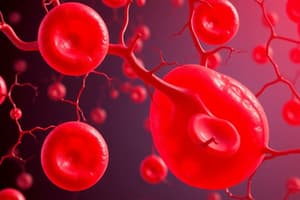Podcast
Questions and Answers
What is the primary cell type involved in the neoplastic transformation in primary myelofibrosis (PMF)?
What is the primary cell type involved in the neoplastic transformation in primary myelofibrosis (PMF)?
- Lymphocytes
- Myeloid cells
- Pluripotent hematopoietic stem cells (correct)
- Erythrocytes
Which mutation is most frequently associated with primary myelofibrosis?
Which mutation is most frequently associated with primary myelofibrosis?
- JAK2 mutation (correct)
- MPL mutation
- CALR mutation
- FLI1 mutation
What percentage of patients with primary myelofibrosis are likely to remain asymptomatic?
What percentage of patients with primary myelofibrosis are likely to remain asymptomatic?
- 70%
- 10%
- 30% (correct)
- 50%
Which of the following symptoms is the most common presenting symptom in primary myelofibrosis?
Which of the following symptoms is the most common presenting symptom in primary myelofibrosis?
What is the primary cytokine secreted that contributes to fibroblast formation in primary myelofibrosis?
What is the primary cytokine secreted that contributes to fibroblast formation in primary myelofibrosis?
Which of the following mutations may also be involved in primary myelofibrosis besides JAK2?
Which of the following mutations may also be involved in primary myelofibrosis besides JAK2?
What is the incidence rate of primary myelofibrosis per 100,000 person-years?
What is the incidence rate of primary myelofibrosis per 100,000 person-years?
What are common inflammatory cytokines expressed in primary myelofibrosis?
What are common inflammatory cytokines expressed in primary myelofibrosis?
What is one of the major criteria for diagnosing primary myelofibrosis in the overtly fibrotic stage?
What is one of the major criteria for diagnosing primary myelofibrosis in the overtly fibrotic stage?
In the pre-fibrotic/early stage of primary myelofibrosis, what is the maximum grade of reticulin/collagen fibrosis allowed?
In the pre-fibrotic/early stage of primary myelofibrosis, what is the maximum grade of reticulin/collagen fibrosis allowed?
Which minor criterion can be considered for both stages of primary myelofibrosis?
Which minor criterion can be considered for both stages of primary myelofibrosis?
What is a characteristic laboratory finding in the overtly fibrotic stage of primary myelofibrosis?
What is a characteristic laboratory finding in the overtly fibrotic stage of primary myelofibrosis?
Which mutation is commonly associated with both stages of primary myelofibrosis?
Which mutation is commonly associated with both stages of primary myelofibrosis?
In the pre-fibrotic stage, what hematological finding is typically not present?
In the pre-fibrotic stage, what hematological finding is typically not present?
What percentage of patients with essential thrombocythemia (ET) or polycythemia vera (PV) might develop a PMF-like phenotype?
What percentage of patients with essential thrombocythemia (ET) or polycythemia vera (PV) might develop a PMF-like phenotype?
What laboratory finding indicates a pre-fibrotic stage without evidence of cytological abnormalities?
What laboratory finding indicates a pre-fibrotic stage without evidence of cytological abnormalities?
What is a characteristic morphologic feature observed in Reticulocytosis?
What is a characteristic morphologic feature observed in Reticulocytosis?
What is typically found in the bone marrow during the prefibrotic stage?
What is typically found in the bone marrow during the prefibrotic stage?
Which enzyme is used as part of the diagnostic investigations to assess bone marrow conditions?
Which enzyme is used as part of the diagnostic investigations to assess bone marrow conditions?
What staining technique is essential for confirming the diagnosis during a bone marrow biopsy?
What staining technique is essential for confirming the diagnosis during a bone marrow biopsy?
In the overt fibrotic stage, which feature is commonly observed in bone marrow?
In the overt fibrotic stage, which feature is commonly observed in bone marrow?
Which grade of bone marrow biopsy indicates extensive interconnected type I collagen fibers?
Which grade of bone marrow biopsy indicates extensive interconnected type I collagen fibers?
What is the likely outcome of a bone marrow aspiration during the overt fibrotic stage of myeloproliferative disease?
What is the likely outcome of a bone marrow aspiration during the overt fibrotic stage of myeloproliferative disease?
Which statement about reticulin staining in bone marrow is accurate?
Which statement about reticulin staining in bone marrow is accurate?
Which of the following cytogenetic abnormalities is considered favorable in primary myelofibrosis (PMF)?
Which of the following cytogenetic abnormalities is considered favorable in primary myelofibrosis (PMF)?
Which somatic mutations are classified as 'driver' mutations in myeloproliferative neoplasms (MPN)?
Which somatic mutations are classified as 'driver' mutations in myeloproliferative neoplasms (MPN)?
What effect do unfavorable cytogenetic profiles have on patients with PMF?
What effect do unfavorable cytogenetic profiles have on patients with PMF?
Which of the following abnormalities is an example of an unfavorable cytogenetic finding in PMF?
Which of the following abnormalities is an example of an unfavorable cytogenetic finding in PMF?
Which treatment is known to be effective in myelofibrosis associated with del(5q)?
Which treatment is known to be effective in myelofibrosis associated with del(5q)?
Which genetic mutation has been found in less than 5% of patients with myelofibrosis as potentially causative?
Which genetic mutation has been found in less than 5% of patients with myelofibrosis as potentially causative?
What is the significance of identifying dwarf megakaryocytes in a patient suspected of myelofibrosis?
What is the significance of identifying dwarf megakaryocytes in a patient suspected of myelofibrosis?
Which technique is suggested for the diagnostic exclusion of other myeloid neoplasms in suspected primary myelofibrosis?
Which technique is suggested for the diagnostic exclusion of other myeloid neoplasms in suspected primary myelofibrosis?
What is a key distinguishing feature of megakaryocytes in essential thrombocythemia (ET) compared to prefibrotic primary myelofibrosis (PMF)?
What is a key distinguishing feature of megakaryocytes in essential thrombocythemia (ET) compared to prefibrotic primary myelofibrosis (PMF)?
What is the median survival time for patients diagnosed with primary myelofibrosis (PMF)?
What is the median survival time for patients diagnosed with primary myelofibrosis (PMF)?
Which of the following is not one of the independent predictors of inferior survival in the IPSS for PMF?
Which of the following is not one of the independent predictors of inferior survival in the IPSS for PMF?
In the context of myelodysplastic syndromes (MDS) or MDS/MPN, what condition should raise suspicion according to the presence of blood cell abnormalities?
In the context of myelodysplastic syndromes (MDS) or MDS/MPN, what condition should raise suspicion according to the presence of blood cell abnormalities?
What is a notable characteristic of patients presenting with acute myeloid leukemia originating from myelofibrosis?
What is a notable characteristic of patients presenting with acute myeloid leukemia originating from myelofibrosis?
Which of the following components is included in the dynamic prognostic model (DIPSS) for PMF?
Which of the following components is included in the dynamic prognostic model (DIPSS) for PMF?
What condition may have similar presentations and mutation profiles as essential thrombocythemia (ET)?
What condition may have similar presentations and mutation profiles as essential thrombocythemia (ET)?
Which of the following best describes the prognosis associated with primary myelofibrosis?
Which of the following best describes the prognosis associated with primary myelofibrosis?
Flashcards are hidden until you start studying
Study Notes
Primary Myelofibrosis (PMF)
- PMF is a myeloproliferative neoplasm (MPN) characterized by clonal myeloproliferation.
- PMF is often, but not always, accompanied by JAK2, CALR, or MPL mutations.
- Incidence of PMF is 0.44-1.5/100,000 person-years, prevalent in ages 60-70.
Pathophysiology
- PMF results from neoplastic transformation of a pluripotent hematopoietic stem cell.
- Somatic mutations of the signaling pathway (JAK2/STAT 5) lead to increased cytokine responsiveness of myeloid cells.
- JAK2 mutations are found in 50-60% of PMF patients.
- Mutations in the thrombopoietin receptor gene (MPL) or the calreticulin (CALR) gene may also occur.
- Triple-negative primary myelofibrosis is a rare case where none of these mutations are present.
- Platelets, megakaryocyte, and monocytes secrete several cytokines such as PDGF, IL-1, TGF beta, and BFGF, contributing to fibroblast formation and excessive collagen deposition.
Clinical Features
- Most patients with PMF are asymptomatic.
- When symptomatic, prominent clinical features include:
- Splenomegaly (90%)
- Hepatomegaly (50%)
- Fatigue (most common presenting symptom)
- Fever, Night sweats, Weight loss
Diagnosis
Major Criteria:
- Prefibrotic/early stage
- Megakaryocyte proliferation and atypia, accompanied by ≤ grade 1 reticulin/collagen fibrosis, granulocyte proliferation/decreased erythropoiesis.
- Overtly fibrotic stage
- Megakaryocyte proliferation and atypia, accompanied by ≥ grade 2 reticulin/collagen fibrosis.
Minor Criteria:
- Anemia not otherwise explained
- Leukocytosis ≥11 × 10 /L
- Palpable splenomegaly
- Increased serum lactate dehydrogenase
- A leukoerythroblastic blood smear
Complete Blood Count/Peripheral Blood Smear
Prefibrotic:
- Initially normal or increased blood counts.
- Mild neutrophilia with a left shift.
- Thrombocytosis (mild/moderate).
- No or borderline anemia.
- No or myeloblasts.
- No or leukoerythroblastosis.
Overt:
- Thrombocytopenia with bizarre abnormal large platelets.
- Leukoerythroblastosis and anemia.
- Usually >5% myeloblasts.
Additional Investigations
- Prefibrotic: Normal or borderline increased lactate dehydrogenase.
- Overt: Increased lactate dehydrogenase.
- Increased alkaline phosphatase, uric acid, leukocyte alkaline phosphatase, and vitamin B12.
Bone Marrow Examination
Prefibrotic:
- Hypercellular bone marrow with atypical megakaryocytic proliferations.
- Erythropoiesis may be reduced with excess granulocyte.
- Absent or slight reticulin fibrosis.
Overt Fibrotic Stage:
- Hypocellular bone marrow with alternating cellular and hypocellular regions.
- Dry tap in 50% of patients.
- Marrow osteosclerosis with irregular, broad bony trabeculae.
- Markedly dilated sinuses.
- Bone marrow biopsy is essential for confirming the diagnosis.
Staining
- Reticulin and trichrome stains are used to detect stromal structural fibres in bone marrow biopsy specimens.
- Increased reticulin staining (reticulin fibrosis) is associated with benign and malignant conditions.
- Increased trichrome staining (collagen fibrosis) is prominent in late stages of severe myeloproliferative diseases.
Cytogenetic/Molecular
- About one-third of PMF patients present with cytogenetic abnormalities.
- Most frequent abnormalities include del(20q), del(13q), trisomy 8 and 9, and abnormalities of chromosome 1.
- Cytogenetic findings in PMF are classified as either favorable or unfavorable based on prognostic effect.
- Unfavorable cytogenetic profile in both PMF and post-PV/ET MF is associated with higher JAK2V617F mutational frequency.
Somatic Mutations
- Somatic mutations in MPN, including PMF, are classified as “driver” and “other” mutations.
- Driver mutations include JAK2, CALR, and MPL and are considered essential for the MPN phenotype.
- Other mutations include ASXL1, SRSF2, U2AF1, and potentially contribute to disease progression and leukemic transformation.
- Research identified potential causative mutations in NRAS, KRAS, PTPN11, GATA2, TP53, and RUNX1 in less than 5% of patients.
Differentiating PMF from Other Myeloid Neoplasms
- PMF should be distinguished from CML, PV, ET, MDS, CMML, and acute myelofibrosis.
- Dwarf megakaryocytes suggest CML.
- Patients fulfilling the diagnostic criteria for PV should be labelled as “PV” even if they display substantial bone marrow fibrosis.
- Prefibrotic PMF with thrombocytosis can mimic ET. Careful morphologic examination is necessary to distinguish between the two.
- MDS or MDS/MPN should be suspected in presence of dyserythropoiesis or dysgranulopoiesis.
- CMML is a possibility in the presence of a peripheral blood monocyte count ≥0.5 × 109/L and monocyte percentage ≥10%.
- Patients with acute MF typically present with severe constitutional symptoms and pancytopenia.
Risk Stratification
- The median survival in PMF is 5 years.
- International Prognostic Scoring System (IPSS) was developed in 2009. It applies five independent predictors of inferior survival:
- Age > 65 years
- Hemoglobin <10 g/dL
- Platelet count <100 × 109/L
- Circulating blasts ≥1%
- Presence of constitutional symptoms
- Dynamic International Prognostic Scoring System (DIPSS) utilizes the same variables as IPSS and can be applied at any time.
- DIPSS also incorporates three additional risk factors:
- Platelet count <100 × 109/L
- White blood cell count >25 × 109/L
- Circulating blasts ≥1%
- DIPSS-plus is the most current model, further refining risk stratification.
Treatment
- Currently, there is no cure for PMF.
- Treatment focuses on managing symptoms and improving quality of life.
- Hydroxyurea is the first-line therapy for controlling the hyperproliferation of myeloid cells.
- Other options include:
- Ruxolitinib (Jak1/2 inhibitor)
- Pomalidomide (immunomodulatory drug)
- Lenalidomide (immunomodulatory drug for patients with del(5q))
- Allogeneic hematopoietic stem cell transplantation (HSCT) is the only potentially curative treatment, but it is associated with significant risks and complications.
Future Perspectives
- Research continues to explore new and innovative treatment options for PMF, aiming to improve patient outcomes and quality of life.
- The use of novel therapies, such as targeted therapies and immunotherapies, is being investigated.
Studying That Suits You
Use AI to generate personalized quizzes and flashcards to suit your learning preferences.




